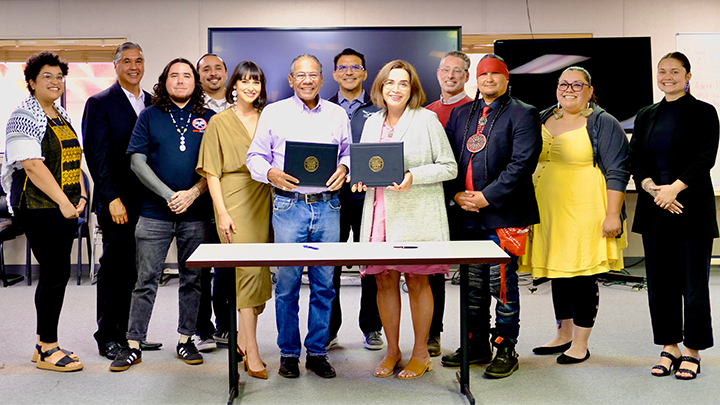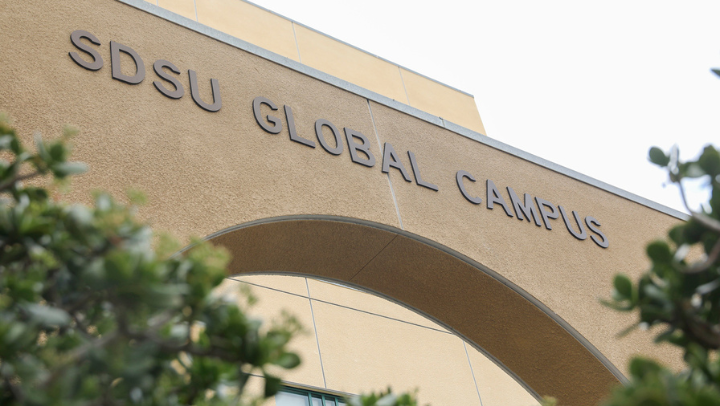SDSU, Kumeyaay Community College sign partnership
The partnership, signed this month, will grant guaranteed transfer eligibility to Kumeyaay Community College students interested in completing four-year degrees at SDSU.

Under a newly signed partnership agreement, San Diego State University and Kumeyaay Community College will work closely to recruit and admit college transfer students to drive increased enrollment and degree attainment.
The new memorandum of understanding initiates an effort to guarantee admission to qualifying students transferring from Kumeyaay Community College, a public community college operated and located on the Sycuan Band of Kumeyaay Nation, a federally-recognized reservation.
"This will ultimately result in more Native students pursuing higher education and earning four-year degrees," said SDSU President Adela de la Torre.
“Native and Indigenous communities have faced historical injustices, forced assimilation and the suppression of their cultures and languages. As institutions of higher learning, it is our duty to proactively work towards a different paradigm: one of access, one of healing, equity, and ultimately self- empowerment,” de la Torre said.
“Given SDSU’s location on Kumeyaay land and its reputation for providing an excellent career-ready education and powerful degrees that drive social mobility for its students, I am proud to enter this partnership in direct support of our Native students,” she also said.
Building a bright future, lighting a fire
Joining de la Torre in the MOU signing on May 6 were Kumeyaay Community College President Stanley Rodriguez and Sycuan Councilman Jamie LaBrake, and other tribal leaders and members from both higher education institutions.
“When I work with our children and our youth, there is a whole pool of wealth out there. These are intelligent and bright kids, and what we are doing is hopefully the beginning of more opportunities to come,” said LaBrake, also a Kumeyaay bird singer.
LaBrake said that, during the signing, he learned that one of his earlier teachers, the late Leroy Joseph Elliott, who served as chairman of the Manzanita Band of the Kumeyaay Nation SDSU program, was appreciative of Elymash Yuuchaap Indigenous Scholars and Leaders Program (Elymash Yuuchaap means “Youth Think”). Since the SDSU program was launched in 2013, it has supported hundreds of students by connecting them as undergraduate scholars to a support network to help them succeed.
“Here we are, building this bridge between us and SDSU, and it’s phenomenal. Everything we are doing is a bright light to our people and adds to the light that came from others before us – that is why this MOU is so important,” LaBrake said.
“It shows the commitment, it shows the university is committing to lighting the spirit for our people and we are working together to keep it lit. Seeing that fire burning so bright is exciting to see.”
Jacob Alvarado Waipuk (a tribal member from San Pasqual Kumeyaay), who also attended the MOU signing, said it is important that the university remain dedicated in fostering a collaborative relationship with the Kumeyaay Nation.
“Through this new partnership and other efforts, we are supporting students for the benefit of their lives today and for future generations,” Alvarado Waipuk said. “This partnership builds on the work of the Office of the Tribal Liaison, American Indian Studies Department, Native Resource Center, and others who are committed to the wellbeing and success of our students.”
SDSU – from its location in San Diego to Imperial Valley – residents on Kumeyaay land. The Kumeyaay Nation, which spreads from San Diego’s north county, down to northern Baja California and far east to Imperial Valley, where SDSU Imperial Valley is located.
Educating, supporting, graduating more students
Under the agreement, SDSU will offer guaranteed admission to Kumeyaay Community College students who have earned a cumulative 2.5 grade-point average in qualified transferable units. In addition to the minimum GPA, students must meet prerequisite requirements for their selected major. The current plan is to have the first cohort of transfer students enrolled in Fall 2025.
Among other efforts, SDSU will create additional course offerings in consultation with university faculty on Kumeyaay language, history and culture, to be housed in the Department of American Indian Studies.
Kumeyaay Community College will provide direct support and preparation to students to prepare for transfer, during their junior year. The college will also work with students to develop their individual educational plans and also identify and recruit qualified students for the transfer option.
Both institutions will also offer training opportunities for academic advisors at both campuses, and co-host application and transfer workshops.
In addition to the long-standing Department of American Indian Studies, and over about the last five years, SDSU has expanded programs and initiatives dedicated to increasing support for Native and Indigenous students and other community members, to include:
- The Native Resource Center, which connects students to community and resources that benefit their academic and social wellbeing.
- SDSU Howka Weekend is a personalized event for admitted students and their families, providing information about the university’s academic programs, resources, centers and student life.
- Student organizations, such as the Native American Student Alliance and Indigenous Social Work Association.
“Supporting Native and Indigenous students promotes educational equity by addressing systemic barriers to access and success,” said David Kamper, professor and major advisor of the Department of American Indian Studies. “We are very grateful for this opportunity to work collaboratively to redress these systemic and structural barriers, and I am proud of this partnership and the way it will serve Native, particularly Kumeyaay, students.”



